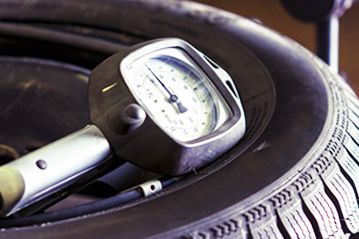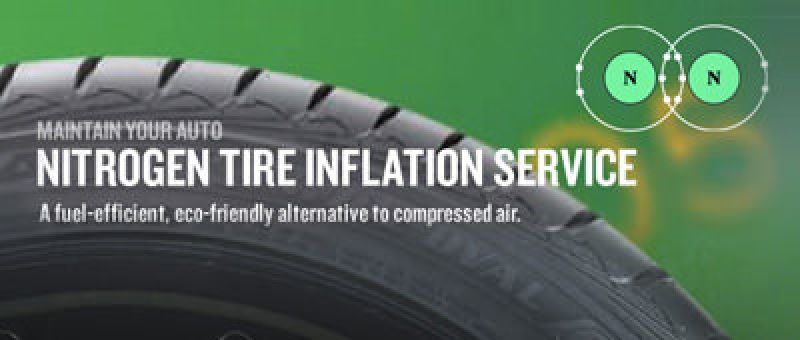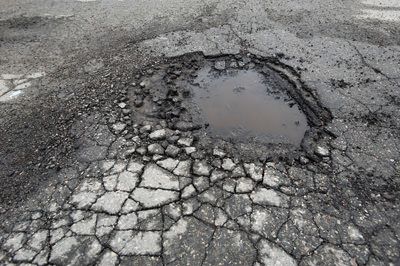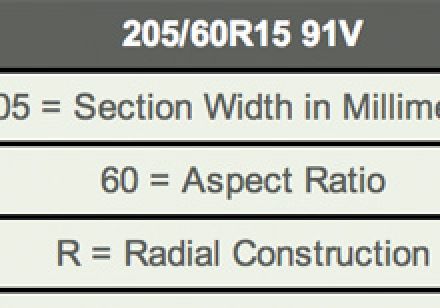A true confession by someone who should know better.
Aaron Gold

It was an uneventful drive home from dinner with friends in Ventura. Robin was at the wheel of our aging Honda Accord, and as we took our exit off the freeway and slowed to a stop, we heard a soft FOOMP! from the front of the car.
"Was that the tire?" Robin said. We pulled over to look.
Yep, it was the tire, alright—the right-front, flat as a pancake with a big gash on the inside edge. It was a blowout, and had it happened just a few minutes earlier, it would have been a disaster.
A blowout is a sudden failure of a tire, usually due to wear, a defect, or (most commonly) simple under inflation. A blowout is one of the most frightening things that can happen to a driver. Experts say the way to handle a blowout is to keep your foot on the gas and steer the car out of any resulting skid. That's easy to say but extremely difficult to do, especially when your car, which up until that point had been calmly cruising down the road, is suddenly a missile gone mad, violently pulling to one side or the other. Most drivers panic and slam on the brakes—who can blame them?—but that's about the worst thing you can do, and it explains why tire blowouts cause over 2,000 accidents and kill over 500 drivers each year.
We were only going about 15 miles per hour when our Accord's tire blew, so it was a complete non-event. For the previous 40 minutes, Robin had been bombing along at her usual 75. Our Honda Accord is well past its 15th birthday, and lacks advanced safety features like side airbags or electronic stability control. Robin is an excellent driver - I'm not just saying that because she'll read this; she really is—but had that tire let go just a couple of minutes earlier, it's all but guaranteed that we would have added to the aforementioned statistics.
WHAT WENT WRONG?

Most tire blowouts are caused by under-inflation; there simply isn't enough air in the tire. When a tire is underinflated, the side of the tire flexes more (the side-wall always flattens a bit at the bottom as the tire rolls). That generates heat, and heat leads to tire failure.
What many people don't realize is that tires lose pressure over time - about 1 pound per square inch (PSI) every month plus 1 PSI for every 10-degree drop in temperature. Most passenger car tires are inflated to around 35 PSI, so it doesn't take long for them to get dangerously low. Newer cars have a tire pressure monitoring system (TPMS) that lights up a warning on the dash if the tires get low; owners of older cars have to remember to check those pressures regularly.
Our car is too old to have a TPMS (it's been mandatory since 2007), so I'm in the check-it-regularly club. That wasn't the mistake I made. Our car was out of alignment, something I knew about but had ignored. The front wheels were cocked ever so slightly, and as a result, the inside edge of the tire was wearing more quickly - so quickly that it had worn right through the rubber and down to the steel cords that give the tire its strength. We had good name-brand tires on the car, but no tire, no matter how high the quality, could withstand something like that.
Our car was, quite literally, a disaster waiting to happen and knowing what I know about tires, well let's just say I should have known better.
I am religious about checking my tires. I preach it from my online automotive pulpit: Check thine air pressures, check thine tread. Check them every month, lest your car riseth up and smiteth thee.
And I had checked my tires—at least I thought I had. I checked the pressure and I checked the tread. But I never took a really good look at the tires. Had I bothered to turn the wheels, or even run my hand to the back of the tire, I would have felt the worn-down rubber and known I had a problem. Instead, I'd been making cursory checks. Not good enough.
After discovering what killed the right-side tire, I went around to the left side. The tire there looked fine, but when I reached around to feel its inside edge, I cut my finger on the exposed steel cords.
TIRES: THE MOST IMPORTANT SAFETY FEATURE

And yet, next to the driver, the tires are the single most important safety feature on our cars. They are all that connects our speeding 3,000-pound metal-and-glass bullets to the pavement beneath them. When we steer, when we swerve, when we brake or accelerate, it is the tires that translate our whims into motion.
Modern-day cars are packed with active safety equipment designed to keep us from having an accident: Antilock brakes, electronic stability control, even lane-departure-correction systems that can steer a drifting car back into its lane. And yet every one of these systems relies on the tires' grip on the road. No tire, no control, as anyone who has had a blowout can tell you - if they lived to tell about it.
THE MORAL OF THE STORY

Don't ignore those anonymous black rubber donuts, because they are, quite literally, keeping you alive. Take it from a fellow who knows: ignoring your tires can cause a marriage blowout and so much more.



